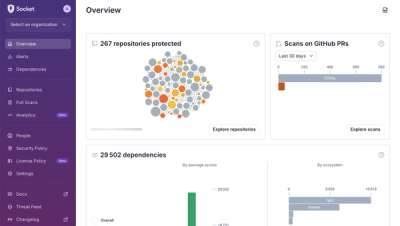
Research
wget to Wipeout: Malicious Go Modules Fetch Destructive Payload
Socket's research uncovers three dangerous Go modules that contain obfuscated disk-wiping malware, threatening complete data loss.
|Logo|
|pypi| |conda| |binder| |gitter| |Zenodo DOI|
Scikit-Optimize, or skopt, is a simple and efficient library to
minimize (very) expensive and noisy black-box functions. It implements
several methods for sequential model-based optimization. skopt aims
to be accessible and easy to use in many contexts.
The library is built on top of NumPy, SciPy and Scikit-Learn.
We do not perform gradient-based optimization. For gradient-based
optimization algorithms look at
scipy.optimize
here <http://docs.scipy.org/doc/scipy/reference/optimize.html>_.
.. figure:: https://github.com/scikit-optimize/scikit-optimize/blob/master/media/bo-objective.png :alt: Approximated objective
Approximated objective function after 50 iterations of gp_minimize.
Plot made using skopt.plots.plot_objective.
Static documentation <https://scikit-optimize.github.io/>__scikit-optimize requires
You can install the latest release with: ::
pip install ft-scikit-optimize
This installs an essential version of scikit-optimize. To install scikit-optimize with plotting functionality, you can instead do: ::
pip install 'ft-scikit-optimize[plots]'
This will install matplotlib along with scikit-optimize.
In addition there is a conda-forge <https://conda-forge.org/>_ package
of scikit-optimize:
::
conda install -c conda-forge scikit-optimize
Using conda-forge is probably the easiest way to install scikit-optimize on Windows.
Find the minimum of the noisy function f(x) over the range
-2 < x < 2 with skopt:
.. code:: python
import numpy as np
from skopt import gp_minimize
def f(x):
return (np.sin(5 * x[0]) * (1 - np.tanh(x[0] ** 2)) +
np.random.randn() * 0.1)
res = gp_minimize(f, [(-2.0, 2.0)])
For more control over the optimization loop you can use the skopt.Optimizer
class:
.. code:: python
from skopt import Optimizer
opt = Optimizer([(-2.0, 2.0)])
for i in range(20):
suggested = opt.ask()
y = f(suggested)
opt.tell(suggested, y)
print('iteration:', i, suggested, y)
Read our introduction to bayesian optimization <https://scikit-optimize.github.io/stable/auto_examples/bayesian-optimization.html>__
and the other examples_.
The library is still experimental and under heavy development. Checkout
the next milestone <https://github.com/scikit-optimize/scikit-optimize/milestones>__
for the plans for the next release or look at some easy issues <https://github.com/scikit-optimize/scikit-optimize/issues?q=is%3Aissue+is%3Aopen+label%3AEasy>__
to get started contributing.
The development version can be installed through:
::
git clone https://github.com/freqtrade/ft-scikit-optimize.git
cd ft-scikit-optimize
pip install -e.
Run all tests by executing pytest in the top level directory.
To only run the subset of tests with short run time, you can use pytest -m 'fast_test' (pytest -m 'slow_test' is also possible). To exclude all slow running tests try pytest -m 'not slow_test'.
This is implemented using pytest attributes <https://docs.pytest.org/en/latest/mark.html>__. If a tests runs longer than 1 second, it is marked as slow, else as fast.
All contributors are welcome!
Making a Release
The release procedure is almost completely automated. By tagging a new release
travis will build all required packages and push them to PyPI. To make a release
create a new issue and work through the following checklist:
* update the version tag in ``__init__.py``
* update the version tag mentioned in the README
* check if the dependencies in ``setup.py`` are valid or need unpinning
* check that the ``doc/whats_new/v0.X.rst`` is up to date
* did the last build of master succeed?
* create a `new release <https://github.com/scikit-optimize/scikit-optimize/releases>`__
* ping `conda-forge <https://github.com/conda-forge/scikit-optimize-feedstock>`__
Before making a release we usually create a release candidate. If the next
release is v0.X then the release candidate should be tagged v0.Xrc1 in
``__init__.py``. Mark a release candidate as a "pre-release"
on GitHub when you tag it.
Commercial support
------------------
Feel free to `get in touch <mailto:tim@wildtreetech.com>`_ if you need commercial
support or would like to sponsor development. Resources go towards paying
for additional work by seasoned engineers and researchers.
Made possible by
----------------
The scikit-optimize project was made possible with the support of
.. image:: https://avatars1.githubusercontent.com/u/18165687?v=4&s=128
:alt: Wild Tree Tech
:target: http://wildtreetech.com
.. image:: https://i.imgur.com/lgxboT5.jpg
:alt: NYU Center for Data Science
:target: https://cds.nyu.edu/
.. image:: https://i.imgur.com/V1VSIvj.jpg
:alt: NSF
:target: https://www.nsf.gov
.. image:: https://i.imgur.com/3enQ6S8.jpg
:alt: Northrop Grumman
:target: http://www.northropgrumman.com/Pages/default.aspx
If your employer allows you to work on scikit-optimize during the day and would like
recognition, feel free to add them to the "Made possible by" list.
.. |pypi| image:: https://img.shields.io/pypi/v/ft-scikit-optimize.svg
:target: https://pypi.python.org/pypi/scikit-optimize
.. |conda| image:: https://anaconda.org/conda-forge/scikit-optimize/badges/version.svg
:target: https://anaconda.org/conda-forge/scikit-optimize
.. |Logo| image:: https://avatars2.githubusercontent.com/u/185785ft-scikit-optimize50?v=4&s=80
.. |binder| image:: https://mybinder.org/badge.svg
:target: https://mybinder.org/v2/gh/scikit-optimize/scikit-optimize/master?filepath=examples
.. |gitter| image:: https://badges.gitter.im/scikit-optimize/scikit-optimize.svg
:target: https://gitter.im/scikit-optimize/Lobby
.. |Zenodo DOI| image:: https://zenodo.org/badge/54340642.svg
:target: https://zenodo.org/badge/latestdoi/54340642
.. _examples: https://scikit-optimize.github.io/stable/auto_examples/index.html
FAQs
Sequential model-based optimization toolbox.
We found that ft-scikit-optimize demonstrated a healthy version release cadence and project activity because the last version was released less than a year ago. It has 2 open source maintainers collaborating on the project.
Did you know?

Socket for GitHub automatically highlights issues in each pull request and monitors the health of all your open source dependencies. Discover the contents of your packages and block harmful activity before you install or update your dependencies.

Research
Socket's research uncovers three dangerous Go modules that contain obfuscated disk-wiping malware, threatening complete data loss.

Research
Socket uncovers malicious packages on PyPI using Gmail's SMTP protocol for command and control (C2) to exfiltrate data and execute commands.

Product
We redesigned Socket's first logged-in page to display rich and insightful visualizations about your repositories protected against supply chain threats.